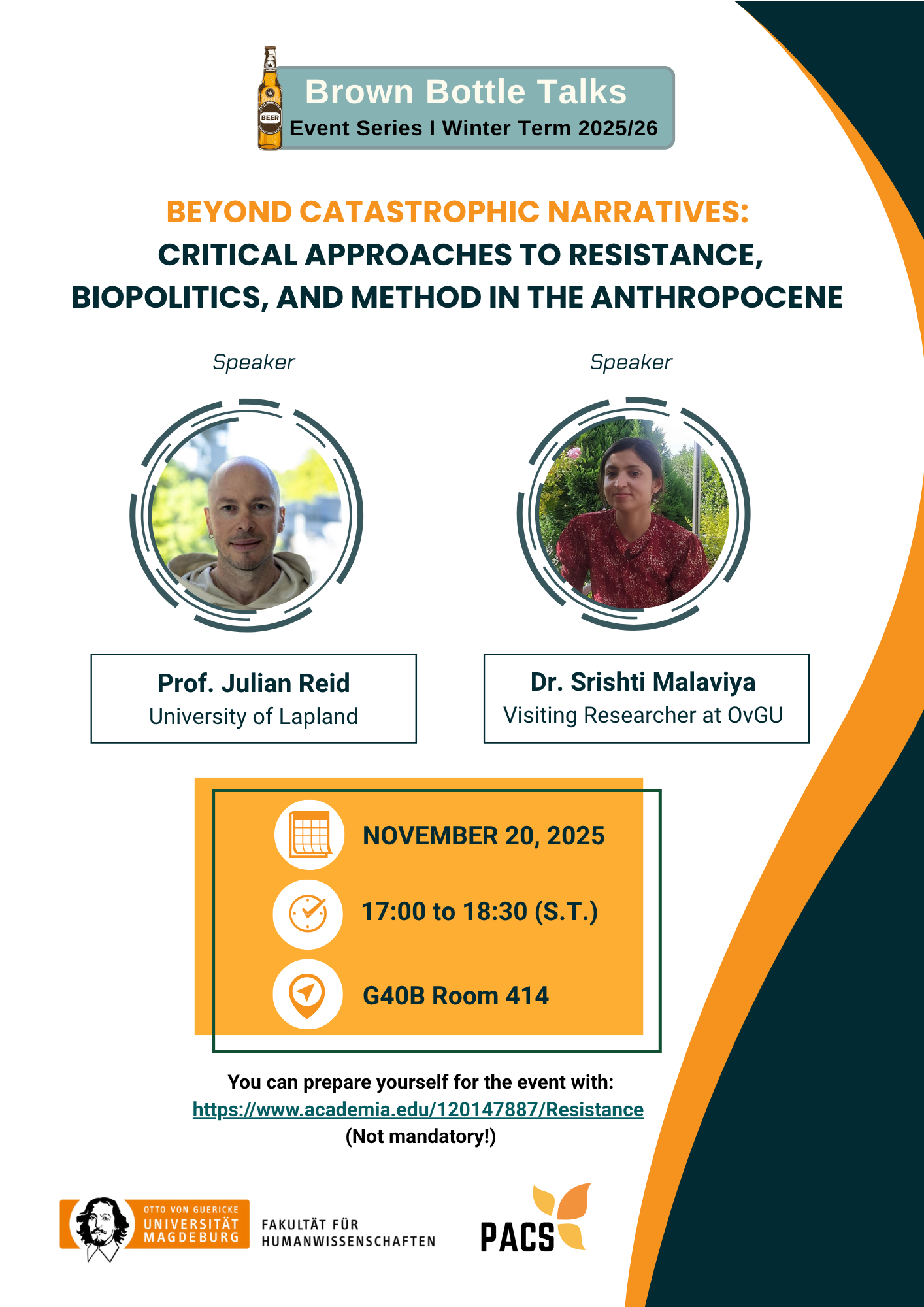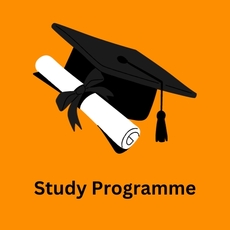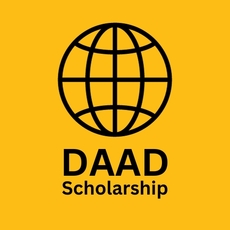News
Brown Bottle Talk - Event Series: "Rethinking Resistance in the Anthropocene: Catastrophic Biopolitics and Nomadic Methodologies"

With the topic "Rethinking Resistance in the Anthropocene: Catastrophic Biopolitics and Nomadic Methodologies", the second round of talks will be held by Prof. Julian Reid (University of Lapland) and Dr. Srishti Malaviya (Visiting Researcher at OvGU).
📆 When: 20th of November
⏰Time: from 17:00 until 18:30 (ST).
📍Where: G40 Room 414
In the face of climate crisis and escalating global instability, much of contemporary political thought is shaped by catastrophic narratives that frame governance through the lens of impending collapse.
Our first guest speaker, Julian Reid, critiques this catastrophic biopolitics - a framework that treats planetary survival as a management problem centered on 'saving life.' Rather than seeking more expansive or inclusive biopolitical models, Julian Reid proposes an alternative approach that abandons 'life' as the central referent of politics. Drawing on political eschatology, nomadic imagination, and contemporary cinema, his presentation outlines the conditions for a political subject capable of resisting biopolitical reason and its hold on Anthropocene thinking.
Building on this, our second speaker, Srishti Malaviya, invites us to think with nomadic methodologies of resistance - those that do not solidify into clear narratives or enduring movements. What forms of resistance emerge when we let go of the need for meaning, coherence, or institutional recognition? Through this lens, resistance becomes a moment of rupture and reinvention rather than consolidation. Following these moments of nomadic imagination may allow insight into methodologies of resistance that appear outside of institutional framings of resilience.
You can prepare yourself for the event with: https://www.academia.edu/120147887/Resistance - Not mandatory!
We will provide beer, soft drinks and some snacks. It is a great possibility to have a chat in an informal setting.
We very much look forward to seeing you all there!
PACS is present at the World Conference of Humanitarian Studies in Istanbul, Turkey

Our PD Dr. rer. pol. habil. Kristina Roepstorff, has taken an active role in the organisation of two panels at the recent Conference on Humanitarian Studies, titled “Humanitarianism in Crisis: New Realities in Practices and Knowledges”
The first panel, “Book Launch: An Introduction to Humanitarian Action”, explores a new textbook focused on the workings of the humanitarian sector and current debates around it.
The second panel, “The politics of humanitarian negotiations”, investigates how negotiations in humanitarian contexts are embedded in political, economic and military dynamics.
The Conference on Humanitarian Studies addresses how current global crises—such as wars in Gaza and Ukraine, neglected conflicts in Sudan, Myanmar, and the DRC, and widespread disasters—challenge the foundations of humanitarianism. As political interests, inequality, and isolationist attitudes undermine humanitarian principles, the moral legitimacy of aid is increasingly at risk. The conference explores how humanitarian actors navigate these shifts amid geopolitical tensions, economic disparities, and technological change, including the rise of AI and decolonial perspectives. It calls for rethinking humanitarian action and knowledge production to foster more just, effective, and inclusive responses to an increasingly complex world.
You can find more information here:
• Panel 1: https://conference.ihsa.info/proposed-panels/view/5810/
• Panel 2: https://conference.ihsa.info/proposed-panels/view/5714/
• Conference overview: https://conference.ihsa.info/about/
Key Information: Registering for Thesis Supervision - Winter Term 2025/2026
Starting with the Winter Term 2025/26, we are introducing a new digital registration and allocation system for MA thesis supervision. This tool is designed to make the supervision process more transparent, fair, and manageable for both students and staff, and to help ensure that all students can complete their theses in a timely and well-supported manner.
We understand that changes like this can initially feel a bit overwhelming, but please rest assured: this is not meant to cause additional pressure — in fact, quite the opposite. Our goal is to support you better, provide clear communication, and ensure that supervision capacity is fairly distributed.
Key Information – Winter 2025 Registration Round
• Registration Deadline: 25 October 2025
• Publication of Supervisor Assignments: 1 November 2025
• Where: https://cloud.ovgu.de/apps/forms/s/kjwSozaabzEQEEj2j5qiNRJe
Through this tool, you can submit up to three preferences each for your first and second supervisor. While we do our best to match you with your preferred choices, please understand that allocations are based on availability, expertise, and fair workload distribution. If it turns out that none of your preferred supervisors can be assigned, you will have the option to withdraw your application and reapply in the next round.
New: Two Allocation Rounds Per Year & Six-Month Supervision Window
To better plan supervision capacity, we will offer two registration rounds per year — one at the beginning of each term. Once your supervision is confirmed, it is valid for six months, meaning that we expect the thesis to be submitted within that timeframe.
If, for any reason, you are unable to submit within six months, you will need to reapply in the next round. However, exceptions are possible in cases such as illness, fieldwork delays, or other valid reasons. In such cases, an extension request can be submitted and will be reviewed individually.
Already Have a Supervisor? Please Register Anyway
If you are already in contact with a supervisor but do not plan to submit your thesis before 1 November 2025, we kindly ask that you also register in the new system.
Don't worry — you will not lose your current supervisor. This step is only necessary to give us a clear overview of all active and upcoming supervisions.
External Supervision or Partial Supervision at the Chair
If you are supervised by someone outside the Chair of International Relations but still wish to have one supervisor from our Chair, please use the system as well.
You'll be able to note down your external supervisor in the registration form, so we can take that into account when assigning additional supervision.
Please note: The system is currently available only for PACS students seeking supervision through the Chair of International Relations. We plan to expand it to include other chairs and departments in the future.
Not Writing Yet? No Pressure
If you plan to start working on your thesis in early 2026 or during the Summer Term, there's no need to apply now. A new registration round will open in early 2026, with its own deadlines and announcements. So please only apply when you're ready to begin planning your thesis.
For full details, please visit:
https://www.pacs.ovgu.de/Study+Programme/Thesis.html
If you have any questions or concerns, please don't hesitate to reach out at . We're here to help guide you through the process and ensure you feel supported at every step.
With best wishes,
Your PACS Team





